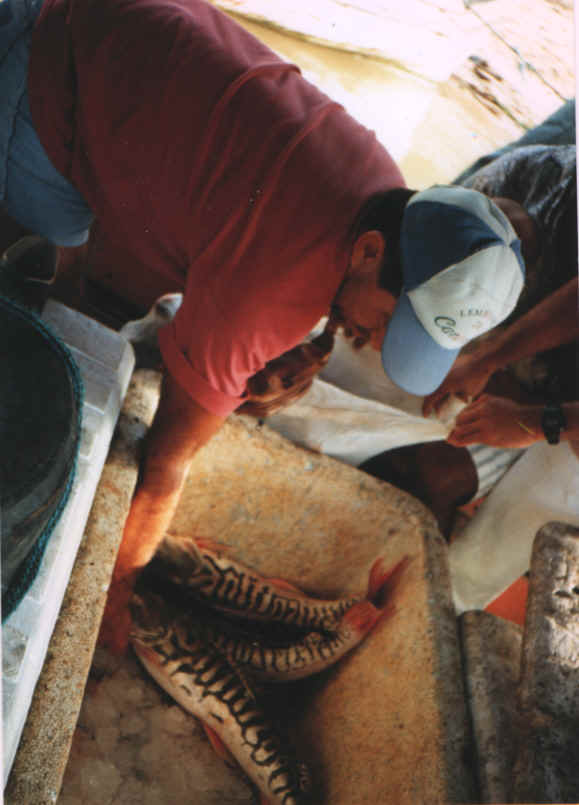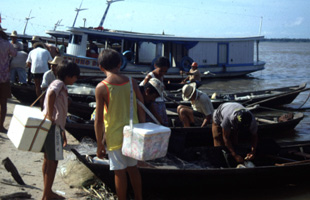Fish is sold fresh, salted or on ice. fresh fish has been caught the night before and transported on a passenger boat. Normally larger fish are sold fresh, such as tambaqui or pirarucu. Salted fish has a longer life and is rarely for local consumption. It is mostly sold to the salted fish exporting company, a small wooden shack and a large drying area. More and more commonly, fish is caught and stored on ice in a polystyrene box for a few days. This gives more flexibility to the producer who can control when he markets the fish. In a few cases in Parú, there are specially equipped boats (geleiras) to store fish and ice ranging from four to eight tonne capacity. On these boats a crew of about eight young men work in pairs catching fish; normally, they are related to the owner as either son or nephew. Their catches are often sold to the fish exporting factories, which also sell ice and process the fish.
There is no single strategy for the marketing of fish since the place and manner depends on the season and the type of fish.
People get up in the middle of the night to make the journey downstream to Obidos and to arrive as early as possible. Fish can be sold by men or women. As any boat from the interior approaches Obidos, fish traders will group together and wait for it to dock. These traders descend aggressively upon the boat, anxious to see what is available. This scene of confusion takes place as soon as the boat arrives. There is much heckling over the price, size and quality of the fish. Prices go up and down depending on market availability, demand and inflation (which during the time I was conducting fieldwork ran at over twenty percent a month) and the seller of fish rarely has any idea how to compare the price being offered to any other. 
There is a good deal of distrust on both sides. Often the first traders to board the boat are the ones who offer the lowest available prices, in the knowledge that the new arrivals will not know about higher prices available. Furthermore, they know that the producers want to sell as quickly as possible in order to have the money to buy other things. Thus, the knowledge of fisherpeople is confirmed; they see once more that traders are only interested in exploiting poor people. Some fisherpeople will refuse to sell until they gets the right deal. Traders may intimidate some producers to obtain a quick sale, by claiming that prices are low everywhere, and that he could buy the same fish more cheaply elsewhere, but wants to do his `friend' a favour; or he may deride the size and quality of the fish. The outcome depends on how quickly the producer wants to get away and how much pressure the trader can exert, as well as experience of previous interactions.
It is pertinent to note that the producers think the mark up price to be 100%, meaning the traders get the same amount of money for carrying the fish to their market stall and then selling it, as they do for catching the fish and bringing them to market. In reality, the mark up is about 20%. The mistaken and exaggerated view about the profit made illustrates how much Parúaros suspect outsiders, and those who do not work in particular. I put the discrepancy to Parúaros, to which their reply was to suspect that I was being lied to.
The point of selling fish is to raise money to buy important household items, such as cooking oil, salt, sugar, soap, kerosene and toiletries. These goods are for household consumption and are mostly bought first. If money is left over, it might be used to buy alcohol, clothes or for the upkeep of fishing or agricultural materials. Very rarely do people actually return with money in their pockets. Saving is therefore a virtually unknown practice. Money is spent as soon as it comes in. People are constantly catching fish in order to come to town to sell their catch, in order to have money to buy daily necessities. This perpetual cycle both confirms and limits their freedom as autonomous producers and consumers, but dependent and indifferent retailers of their goods.


 Traditionally, rural producers have not marketed their own produce directly to consumers. Instead they sell it onto middlemen (marreteiros), who in turn retail it to townspeople or transport it for sale elsewhere. (see McGrath 1989 for an excellent account of trading in Amazonia). Nowadays there is a movement by the fisherpeople's union to encourage people to sell their own fish. This has been resisted by both the traders and the producers. The former would obviously lose their jobs and the latter are unwilling, because it would mean more time spent working. Consumers prefer to buy their food from traders because they are more likely to receive good quality produce. According to rich town-dwellers, it is said the only time when fisherpeople want to sell their produce is when it is off, (been out of water and in the sun too long), so that no trader would buy the fish.
Traditionally, rural producers have not marketed their own produce directly to consumers. Instead they sell it onto middlemen (marreteiros), who in turn retail it to townspeople or transport it for sale elsewhere. (see McGrath 1989 for an excellent account of trading in Amazonia). Nowadays there is a movement by the fisherpeople's union to encourage people to sell their own fish. This has been resisted by both the traders and the producers. The former would obviously lose their jobs and the latter are unwilling, because it would mean more time spent working. Consumers prefer to buy their food from traders because they are more likely to receive good quality produce. According to rich town-dwellers, it is said the only time when fisherpeople want to sell their produce is when it is off, (been out of water and in the sun too long), so that no trader would buy the fish. 